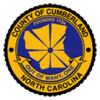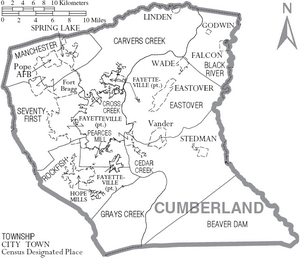Cumberland County, North Carolina facts for kids
Quick facts for kids
Cumberland County
|
|||||
|---|---|---|---|---|---|
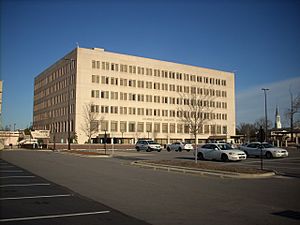
Cumberland County Courthouse in Fayetteville
|
|||||
|
|||||
| Motto(s):
"Out Of Many, One"
|
|||||
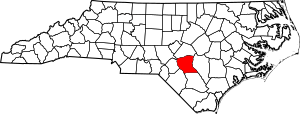
Location within the U.S. state of North Carolina
|
|||||
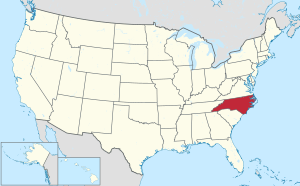 North Carolina's location within the U.S. |
|||||
| Country | |||||
| State | |||||
| Founded | 1754 | ||||
| Named for | Prince William, Duke of Cumberland | ||||
| Seat | Fayetteville | ||||
| Largest community | Fayetteville | ||||
| Area | |||||
| • Total | 658.48 sq mi (1,705.5 km2) | ||||
| • Land | 652.56 sq mi (1,690.1 km2) | ||||
| • Water | 5.92 sq mi (15.3 km2) 0.90% | ||||
| Population
(2020)
|
|||||
| • Total | 334,728 | ||||
| • Estimate
(2023)
|
337,890 | ||||
| • Density | 513.4/sq mi (198.2/km2) | ||||
| Time zone | UTC−5 (Eastern) | ||||
| • Summer (DST) | UTC−4 (EDT) | ||||
| Congressional districts | 7th, 9th | ||||
Cumberland County is a county in North Carolina, a state in the United States. In 2020, about 334,728 people lived here. This makes it the fifth-most populated county in North Carolina. The main city and county seat is Fayetteville. Cumberland County is part of the larger Fayetteville Metropolitan Area.
Contents
History of Cumberland County
Cumberland County was created in 1754. It was formed from parts of Bladen County. The county was named after Prince William Augustus, Duke of Cumberland. He was a British army leader.
Over the years, parts of Cumberland County were used to form other counties. In 1771, parts of Cumberland, Johnston, and Orange counties became Wake County. In 1784, the western part of Cumberland County became Moore County. For a short time, the eastern part was called Fayette County. But it went back to being Cumberland County three months later. Later, in 1855, the northern part became Harnett County. Finally, in 1911, parts of Cumberland and Robeson counties formed Hoke County.
Geography of Cumberland County
Cumberland County covers about 658 square miles. Most of this area is land, with a small part being water.
Nature and Parks
Cumberland County has several natural areas and parks. These are great places to explore nature.
- Bushy Lake State Natural Area
- Carvers Creek State Park
- Museum of the Cape Fear Historical Complex
- Oak Grove Plantation
- Old Linden School
- Rhodes Pond Game Land (part)
- Suggs Mill Pond Game Land (part)
- Taliaferro's Division Monument
- William T. Smith House
Rivers and Lakes
Many important rivers and lakes are found in the county:
- Cape Fear River
- Carvers Creek
- Cross Creek
- Hope Mills Lake
- Little River
- Mingo Swamp
- Rockfish Creek
- South River
Neighboring Counties
Cumberland County shares borders with these counties:
- Harnett County (north)
- Sampson County (east)
- Bladen County (south)
- Robeson County (southwest)
- Hoke County (west)
- Moore County (west)
Main Roads
Major highways that pass through Cumberland County include:
- Interstate 95
- Interstate 295
- U.S. Route 13
- U.S. Route 301
- U.S. Route 401
- North Carolina Highway 24
- North Carolina Highway 53
- North Carolina Highway 59
- North Carolina Highway 82
- North Carolina Highway 87
- North Carolina Highway 162
- North Carolina Highway 210
- North Carolina Highway 217
- North Carolina Highway 242
- North Carolina Highway 690
Important Places
Cumberland County is home to several key facilities:
- Fayetteville Regional Airport (an airport for flights)
- Fayetteville Station (a train station)
- Fort Liberty (a large military base, partly in the county)
- Pope Army Airfield (a military airfield)
- Simmons Army Airfield (another military airfield)
People of Cumberland County
| Historical population | |||
|---|---|---|---|
| Census | Pop. | %± | |
| 1790 | 8,730 | — | |
| 1800 | 9,264 | 6.1% | |
| 1810 | 9,382 | 1.3% | |
| 1820 | 14,446 | 54.0% | |
| 1830 | 14,834 | 2.7% | |
| 1840 | 15,284 | 3.0% | |
| 1850 | 20,610 | 34.8% | |
| 1860 | 16,369 | −20.6% | |
| 1870 | 17,035 | 4.1% | |
| 1880 | 23,836 | 39.9% | |
| 1890 | 27,321 | 14.6% | |
| 1900 | 29,249 | 7.1% | |
| 1910 | 35,284 | 20.6% | |
| 1920 | 35,064 | −0.6% | |
| 1930 | 45,219 | 29.0% | |
| 1940 | 59,320 | 31.2% | |
| 1950 | 96,006 | 61.8% | |
| 1960 | 148,418 | 54.6% | |
| 1970 | 212,042 | 42.9% | |
| 1980 | 247,160 | 16.6% | |
| 1990 | 274,566 | 11.1% | |
| 2000 | 302,963 | 10.3% | |
| 2010 | 319,431 | 5.4% | |
| 2020 | 334,728 | 4.8% | |
| 2023 (est.) | 337,890 | 5.8% | |
| U.S. Decennial Census 1790–1960 1900–1990 1990–2000 2010 2020 |
|||
Population in 2020
In 2020, Cumberland County had 334,728 people. There were 128,135 households and 78,365 families. The county is home to a diverse group of people.
| Group | Number | Percentage |
|---|---|---|
| White (not Hispanic) | 133,201 | 39.79% |
| Black or African American (not Hispanic) | 124,173 | 37.1% |
| Native American | 4,647 | 1.39% |
| Asian | 8,943 | 2.67% |
| Pacific Islander | 1,357 | 0.41% |
| Other/Mixed | 22,909 | 6.84% |
| Hispanic or Latino | 39,498 | 11.8% |
Education in Cumberland County
Cumberland County has several colleges and universities. These include Fayetteville State University and Methodist University. There is also Fayetteville Technical Community College.
The Cumberland County Schools district serves most students from kindergarten to 12th grade. It is the fourth largest public school system in North Carolina. Students living on Fort Liberty attend special schools for younger grades. For high school, they go to local public schools.
There are 17 high schools in Cumberland County:
- Cape Fear
- Cross Creek Early College
- Cumberland International Early College
- Douglas Byrd
- E.E. Smith
- Fuller Performance Learning Center
- Gray's Creek
- Howard Health and Life Sciences
- Jack Britt
- Massey Hill Classical
- Pine Forest
- Reid Ross Classical
- Seventy-First
- South View
- Terry Sanford
- Alger B. Wilkins
- Ramsey Street
- Westover
Cumberland County Public Library
The Cumberland County Public Library and Information Center started in 1794. It was the first library group in North Carolina to become officially recognized. The library has eight branches across the county. These branches offer many services for kids and teens. You can find children's programs, homework help, and resources for homeschooling.
The library also offers free downloads of audiobooks, ebooks, and magazines. You can access these from home with your library card. They also have computer classes and spaces for community meetings. In 2012, the library won the National Medal for Museum and Library Service. This award is given to only five libraries in the U.S. each year.
Arts & Culture in Cumberland County
Arts and culture are very important in Cumberland County. In 2022, local arts groups helped create over $72 million in economic activity. They also supported more than 1,100 jobs. Arts and cultural events bring many visitors to the area.
Fun Places to Visit
Cumberland County has many interesting places:
Historic Sites
- Cool Spring Tavern
- Evans Metropolitan AME Zion Church
- Ellerslie Plantation
- The first Golden Corral restaurant
- Hay Street United Methodist Church
- Heritage Square
Museums
- Airborne & Special Operations Museum
- Museum of the Cape Fear Historical Complex
Parks and Recreation
- Cape Fear Botanical Garden
Shopping
Theaters and Arenas
- Crown Coliseum
Communities in Cumberland County
City
- Fayetteville (This is the main city and where the county government is located.)
Towns
Census-designated place
Townships
Townships are smaller areas within the county.
- Beaver Dam
- Black River
- Carvers Creek
- Cedar Creek
- Cross Creek
- Eastover
- Gray's Creek
- Manchester
- Pearces Mill
- Rockfish
- Seventy-First
Images for kids
See also
 In Spanish: Condado de Cumberland (Carolina del Norte) para niños
In Spanish: Condado de Cumberland (Carolina del Norte) para niños



